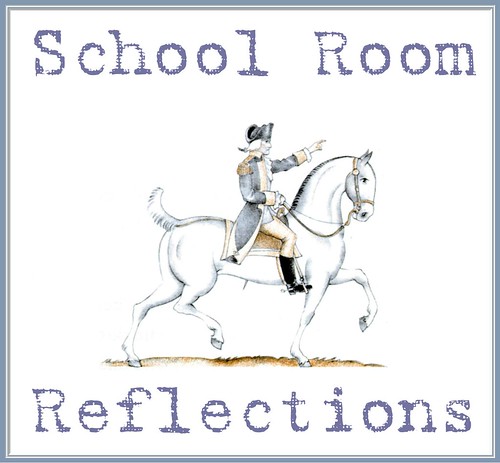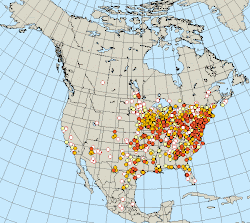8 hours ago
Thursday, August 29, 2013
Thursday, August 1, 2013
2013-2014 Curriculum
Emily - 4th grade
English
Easy Grammar 4
Wordly Wise 4
Literature Comprehension Guides (Veritas Press)
Calligraphy - Prescripts (Classical Conversations)
Bible
Judges-Kings (Veritas Press)
Math
Saxon 54 -- Bob Jones 4
UPDATE: This year's CURRICULUM SWITCH - from Saxon to Bob Jones 4 after Christmas break. Emily does a lot better in math with more visual examples which Saxon has very little of at this level.
Music
Recorder, Mr. Pipes Psalms & Hymns, Children's Choir
Science
Astronomy (Apologia)
Michelle - 6th grade
English
Shurley Grammar 7
Literature Comprehension Guides (Veritas Press)
Bible-Based Writing Lessons (IEW)
Bible
Judges-Kings (Veritas Press)
Math
Saxon 65
Science
Astronomy (Apologia)
Music
Organ, Mr. Pipes Psalms & Hymns
Michael - 11th grade
Dual enrolled at HCC
Spanish I & II, English Comp. I & II, General Psychology
Humanities - History, Bible, Philosophy, Literature
Gileskirk (King's Meadow)
Ligonier Connect
Math
Trigonometry - (Pearson- MyMathLab)
Music
Piano, Chancel Choir, Recorder Ensemble
Dec. 2013 - ACT
Jan. 2014 - SAT
English
Easy Grammar 4
Wordly Wise 4
Literature Comprehension Guides (Veritas Press)
Calligraphy - Prescripts (Classical Conversations)
Bible
Judges-Kings (Veritas Press)
History
1800's - Present (VeritasPress)
Math
UPDATE: This year's CURRICULUM SWITCH - from Saxon to Bob Jones 4 after Christmas break. Emily does a lot better in math with more visual examples which Saxon has very little of at this level.
Music
Recorder, Mr. Pipes Psalms & Hymns, Children's Choir
Science
Astronomy (Apologia)
Michelle - 6th grade
English
Shurley Grammar 7
Literature Comprehension Guides (Veritas Press)
Bible-Based Writing Lessons (IEW)
Bible
Judges-Kings (Veritas Press)
Math
Saxon 65
History
1800's - Present (Veritas Press)
Science
Astronomy (Apologia)
Music
Organ, Mr. Pipes Psalms & Hymns
Michael - 11th grade
Dual enrolled at HCC
Spanish I & II, English Comp. I & II, General Psychology
Humanities - History, Bible, Philosophy, Literature
Gileskirk (King's Meadow)
Ligonier Connect
Math
Trigonometry - (Pearson- MyMathLab)
Music
Piano, Chancel Choir, Recorder Ensemble
Dec. 2013 - ACT
Jan. 2014 - SAT
Tuesday, February 26, 2013
Preparing for the SAT
Preparing for the SAT begins in 1st grade! Yes, it is true. I wouldn't dream of waiting until high school to begin thinking about how to help my children score well on a test that has so many implications for their future. The SAT means cash in their pockets, for one. The way things work today with colleges, SAT scores = $$$ or lack thereof. Everybody knows that, I think.
So, what do we do in elementary school? We make the three Rs our priority. This isn't always the fun part of what we do. We love unit studies, science journals, history, field trips, park days..... but all those things must be secondary. We start our school day with an the RRRs, and once those are done, we move on to the rest.
We do think our bible studies are the most important subject, by the way, but I like to do this after lunch, when we can sit and relax. I like to take my time and not feel rushed with the pressure of getting it done so we can get to the tough subjects. So, bible comes after lunch because I know we will do it and we can all look forward to it. We tried doing bible first thing in the morning years ago, but it was always rushed.
Prioritizing is one of the keys to success and flexibility is another. The flexibility to slow down when something isn't working, try different approaches, or switch curricula is very important. As homeschoolers, we enjoy the possibility of an individualized approach. A one-size-fits-all program is necessary in a school classroom setting. Helping a child love, or at least like, a subject is one of my goals. There are so many resources available out there. Integrating a subject like math into other areas - geography, science, or even art... helps to make it likable for some. Sometimes, it helps to make the subject relevant - a field trip to the grocery store is a great possibility when learning to count money. Cashiers have always been very kind and patient when I've had my children go up to pay with cash in hand, working out the amounts and what change they receive.
Reading is the most important skill to learn in school. That said, my goal in this area was to help my children learn to love it. Video games, daily TV watching and movies are the enemies when it comes to helping your children love to read, simply because those other activities are more stimulating. With one of my children, the choice had to be between reading and being bored sitting on a chair. She always chose reading when I put it that way. Some children mature later than others, and they will need to be allowed to stay with picture books a while longer. The goal, though, is to get them reading books that are not limited in vocabulary. Readers often limit vocabulary, so they are not my favorites. It is very important to have reliable reading lists as resources to pick your children's reading books wisely. Do not let your children free to pick books at the library for themselves! Here are some I've used:
One of the most important tasks to accomplish during elementary school, and one that NONE of my children have liked is to memorize their multiplication tables. Each one of them has shed tears the first few times they HAD to memorize their facts, because they knew there was no way out of it. Once they memorized the table of 3, they were over the hump and went along with it. Becoming proficient and fast at doing arithmetic is very important. I like A Beka's speed drills and have used them with all the kids faithfully. The SAT is a timed test, and although they allow the use of a calculator, there is much arithmetic involved in simple algebra problems which would take too long to do with a calculator. They must have those facts cemented so that they are automatic.
So, what to do if your children are in middle school and don't have this skill down? Stop, and spend a few weeks doing speed drills and memorizing those facts. Nothing else is more important in the math department.
The curriculum we use for high school math:
Pre-algebra BJU
Elementary Algebra by Harold Jacobs
Geomerty by Harold Jacobs
Advanced Algebra and Trig by Paul Foerster
Trigonometry - MyMathLab (online course)
Elementary Algebra by Harold Jacobs
Geomerty by Harold Jacobs
Advanced Algebra and Trig by Paul Foerster
Trigonometry - MyMathLab (online course)
Note: Those last three books are also available at Veritas Press.
About a month before the big day, we take time off from a few of our subjects to fit in SAT practice. I use two resources for this:
If you are not familiar with the SAT, it would be a good idea to buy Cracking the SAT/SAT 2400 and read through the test-taking strategies section. It is important to teach children how to test early on.
Last but not least, make sure you sign your child up at the College Board to receive daily email SAT questions and other announcements, check their calendar for test dates and locations, practice tests, etc.
Best wishes!
March 2013 update - Our son scored very well on the SAT. Although he would like to keep his score private, I can say that if he goes to one of the Florida state universities, because of this score, he will go for free. Dr. Chung's Math book was very helpful in preparing for the test.
February 2014 update - He retook the test in January and scored a 1520 composite, which was great!
April 2014 update - We received a letter from the National Merit Scholar Corporation saying that Michael has met the requirements to enter the 2015 National Merit Scholarship Program!
March 2015 - Michael is a National Merit Scholarship finalist! We are so excited for him! All his hard work is paying off, praise be to God.
June 2015 - Michael decided to go to the University of South Florida because of their generous scholarship offer and being able to live at home and commute. His scholarships from USF as a National Merit scholar would have paid for room and board. He will be saving that money for graduate school.
January 2018 update - Michael graduates from USF this semester, currently has a 4.0 GPA. He took the LSAT in June and was admitted to the University of Florida Law School with a full scholarship!
Michelle is now preparing to take the SAT either in March or May. This will be her second try.
February 2014 update - He retook the test in January and scored a 1520 composite, which was great!
April 2014 update - We received a letter from the National Merit Scholar Corporation saying that Michael has met the requirements to enter the 2015 National Merit Scholarship Program!
March 2015 - Michael is a National Merit Scholarship finalist! We are so excited for him! All his hard work is paying off, praise be to God.
June 2015 - Michael decided to go to the University of South Florida because of their generous scholarship offer and being able to live at home and commute. His scholarships from USF as a National Merit scholar would have paid for room and board. He will be saving that money for graduate school.
January 2018 update - Michael graduates from USF this semester, currently has a 4.0 GPA. He took the LSAT in June and was admitted to the University of Florida Law School with a full scholarship!
Michelle is now preparing to take the SAT either in March or May. This will be her second try.
Curriculum Switch
Every year, almost without fail, after a few months of school, I discover that at least one of the curricula I chose doesn't work for a certain child. This year, it was Shurley Grammar. I used Shurley for the two oldest, but Emily and Michelle just didn't catch on to the system and kept on dragging their feet. So, I had to do the dreaded switch. We are going with BJU English. It is much more of a worksheet type curriculum. I like it better than others I've used or seen. I am familiar with BJU because I have their Spanish program for high school, and I love it. BJU is nicely structured, following a logical incremental sequence. I received the materials yesterday, and am hitting the ground running this morning, we are starting today! I spent some time last night familiarizing myself with the program, and I will continue to learn as we go.
There is always at least one subject that we carry through the summer for one reason or another - usually because the original curriculum didn't work, like this time. I remember last year it was Singapore Math for Emily - a good match for Michelle though.
The flexibility we have as homeschoolers makes this possible, a one-size-fits-all approach would be more affordable, I am sure; but it wouldn't necessarily be beneficial. I am thankful we can afford to make these changes midstream. I think this is one of the reasons why my children don't have a subject that they particularly dislike - they learn that it isn't necessarily a problem with not liking the subject; but rather, it is likely the way it is being presented.
There is always at least one subject that we carry through the summer for one reason or another - usually because the original curriculum didn't work, like this time. I remember last year it was Singapore Math for Emily - a good match for Michelle though.
The flexibility we have as homeschoolers makes this possible, a one-size-fits-all approach would be more affordable, I am sure; but it wouldn't necessarily be beneficial. I am thankful we can afford to make these changes midstream. I think this is one of the reasons why my children don't have a subject that they particularly dislike - they learn that it isn't necessarily a problem with not liking the subject; but rather, it is likely the way it is being presented.
Monday, February 25, 2013
Ligonier Conference
I took Michael to the Ligonier Conference last week. It was a blessing to both of us. The theme was the idea of "No Compromise." It fit well with many of our choices and their repercusions. We are not to expect to be liked for not compromising. In not compromising, many have lost their lives through martyrdom. We were reminded of the saints that came before us and suffered for standing up for what is right and true. One of the first lectures was taught by Dr. Steve Lawson, he talked about the idea of what is true and where our source of truth is. I am looking forward to listening to that talk again, Feet Firmly Planted in Midair. Here is the introduction:
Most students entering college today believe that truth is relative, that what is true for you may not be true for me. In this message, Dr. Steven Lawson will look at the influence relativism has had on our culture and explore the consequences. He will explain the absurd and self-defeating nature of relativism and remind us of God’s call to stand for the unchanging absolute truth of His Word.
I realized while I was there that this yearly conference is more relevant and important to us that the homeschool conference in Orlando that we've gone to many times before. This was my second time at the Ligonier Conference, the first was ten years ago. Much has changed. The location was different and better - the First Baptist Church in Orlando is a larger facility, they had a great hall for the bookstore with many more books, videos, etc.; and Ligonier Ministries has grown and is offering several new resources.
One resource we signed up for was Ligonier Connect. We will be using this for our bible high school curriculum now. Here is an intro:
Most students entering college today believe that truth is relative, that what is true for you may not be true for me. In this message, Dr. Steven Lawson will look at the influence relativism has had on our culture and explore the consequences. He will explain the absurd and self-defeating nature of relativism and remind us of God’s call to stand for the unchanging absolute truth of His Word.
I realized while I was there that this yearly conference is more relevant and important to us that the homeschool conference in Orlando that we've gone to many times before. This was my second time at the Ligonier Conference, the first was ten years ago. Much has changed. The location was different and better - the First Baptist Church in Orlando is a larger facility, they had a great hall for the bookstore with many more books, videos, etc.; and Ligonier Ministries has grown and is offering several new resources.
One resource we signed up for was Ligonier Connect. We will be using this for our bible high school curriculum now. Here is an intro:
Wednesday, February 20, 2013
Biblical reasons why not to put our children in public schools
One of my friends on Facebook shared this video. After listening to it I wondered, again, why Christians still have their children in public schools.
Subscribe to:
Posts (Atom)


















